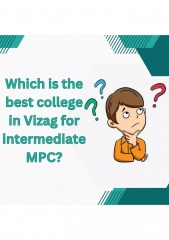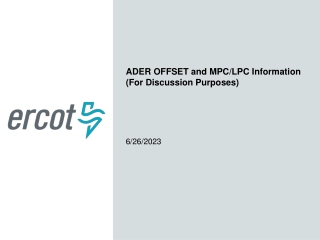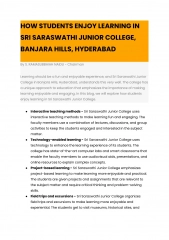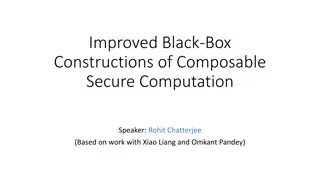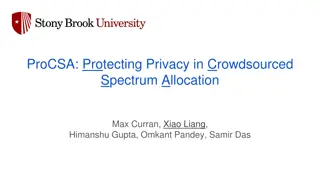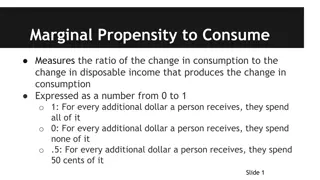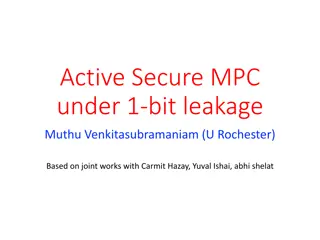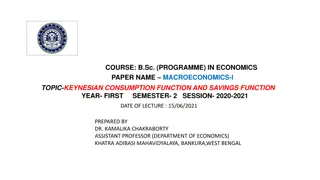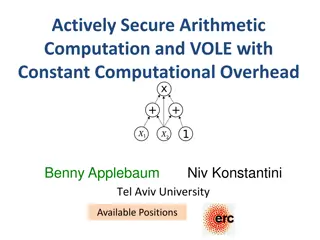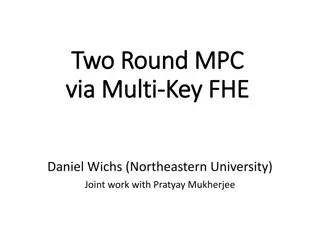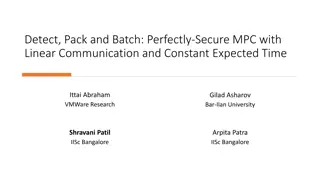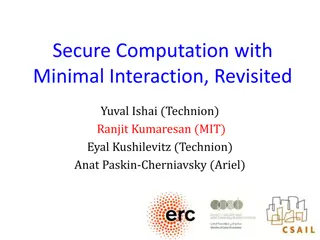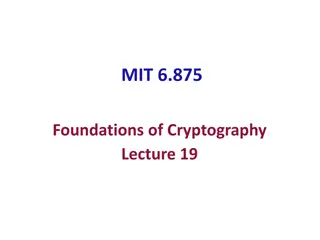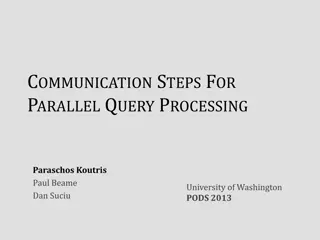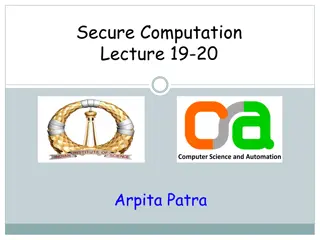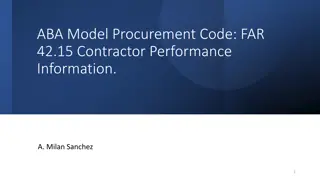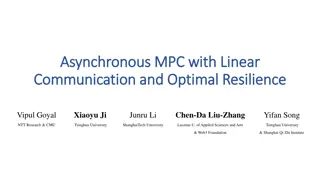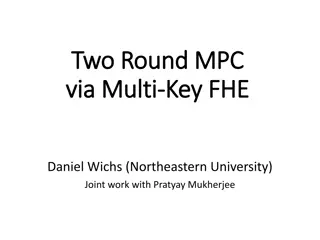Chemistry of Natural Products - MPC-104T
Learn about the structural elucidation of camphor, a white crystalline substance derived from the wood of camphor laurel and other related trees. Discover its chemical properties, uses, and references for further study.
2 views • 7 slides
WHICH IS THE BEST JUNIOR COLLEGE IN VIZAG FOR INTERMEDIATE MPC
WHICH IS THE BEST COLLEGE IN VIZAG FOR INTERMEDIATE MPC?#bestcollege\n#vizageducation\n#mpccourses#trending\n\nAre you a student looking for the best college in Vizag to pursue Intermediate MPC? Look no further, Manasa Junior College is the top choice for aspiring students in Vizag. With a proven tr
4 views • 1 slides
Understanding ADER Offset and MPC/LPC Information
Explore the concept of ADER Offset and MPC/LPC information for energy resources, focusing on response capabilities, net power flow, and offset applications. Examples illustrate how the ADER is managed with and without offsets, alongside bid strategies in energy markets.
2 views • 6 slides
SRI SARASWATHI JUNIOR COLLEGE, BANJARA HILLS, HYDERABAD
At Sri Saraswathi Junior College, we strive to create a safe and nurturing environment where students can learn and grow. Our faculty members are highly qualified and experienced, and they are committed to providing our students with the best possible education.\n\nWe offer a wide range of programs,
1 views • 2 slides
RBI
Reserve Bank of India(RBI)\nThe Reserve Bank of India(RBI) is the Controlling Institution of all Banks in India. It is formed by an Act. It\u2019s owned by the Indian government\u2019s Finance Ministry and takes care of things like inflation, interest rates, lending, and ensuring the financial stab
1 views • 5 slides
Enhanced Security in Multiparty Computation
Explore the improved black-box constructions of composable secure computation, focusing on definitions, objectives, and the formalization basics of multiparty computation (MPC). Learn about the motivating security aspects in MPC and the real/ideal paradigm. Discover how MPC security involves compari
1 views • 68 slides
Enhancing Privacy in Crowdsourced Spectrum Allocation
This research focuses on protecting privacy in crowdsourced spectrum allocation, addressing the security challenges faced due to the presence of multiple entities and the sensitive information collected. By proposing potential ideas like Fully Homomorphic Encryption (FHE) and Secure Multi-Party Comp
0 views • 26 slides
Understanding Fiscal Policy to Combat Recessions
Explore the role of fiscal policy in fighting recessions through stimulating aggregate demand, using government spending and tax cuts. Learn about the Keynesian multiplier effect, MPC, and different policy responses to economic fluctuations. Discover how government interventions can help stabilize t
0 views • 47 slides
Understanding Marginal Propensity to Consume and Save
Marginal Propensity to Consume (MPC) and Marginal Propensity to Save (MPS) measure the ratios of change in consumption and saving to change in disposable income respectively. The relationship between MPC and MPS shows that they equal 1 when combined, with the remainder being saved. The multiplier ef
7 views • 5 slides
Advancements in Active Secure Multiparty Computation (MPC)
Delve into the realm of secure multiparty computation under 1-bit leakage, exploring the intersection of DP algorithms, MPC, and the utilization of leakage for enhanced performance. Discover the overhead implications of achieving active security, as well as the evolution of secure computation protoc
0 views • 43 slides
Understanding Keynesian Consumption and Savings Functions in Macroeconomics
Keynesian Consumption Function relates total consumption to national income, with stable characteristics like MPC and APC. Savings Function shows the relationship between savings and income, highlighting the Marginal Propensity to Save and Average Propensity to Save. Both functions are essential con
0 views • 6 slides
Insights on Environmental Security and Ingenuity
In this tribute to Ran Canetti, insights are shared on environmental security, ingenuity, and secure multi-party computation (MPC). The discussion delves into the essence of ingenuity, addressing why some may misunderstand discoveries. Furthermore, the concept of environmental security and its pivot
0 views • 11 slides
Actively Secure Arithmetic Computation and VOLE Study
Exploring actively secure arithmetic computation and VOLE with constant computational overhead at Tel Aviv University. Understanding how functions are represented in secure computation using arithmetic circuits over boolean circuits. Efficiently evaluating arithmetic circuits over large finite field
0 views • 36 slides
Efficient Multi-Party Computation Techniques
Explore the innovative approaches to Multi-Party Computation (MPC) such as MPC via Fully Homomorphic Encryption (FHE) and Multi-Key FHE. The focus is on minimizing round complexity and achieving secure distributed computations. Learn about key concepts, protocols, and advancements in the realm of MP
0 views • 17 slides
Massively Parallel Algorithm for Minimum Weight Vertex Cover
Massively Parallel Computation (MPC) model for solving the Minimum Weight Vertex Cover problem efficiently, including optimal round complexities and known approximation ratios. The algorithm is designed for graphs with vertices and edges, with each machine processing data synchronously in rounds. Va
0 views • 13 slides
Linear Communication in Secure Multiparty Computation for Efficient and Fast Processing
The research focuses on achieving perfectly secure multiparty computation (MPC) with linear communication and constant expected time. It explores efficient approaches using a broadcast-hybrid model and P2P communication, aiming to balance speed and efficiency in MPC. The study highlights the importa
0 views • 23 slides
Insights into Secure Computation with Minimal Interaction
This paper revisits the concept of secure computation with minimal interaction, focusing on the challenges and possibilities of achieving secure multiparty computation in 2 rounds. Specifically exploring scenarios with 3 and 4 parties, the study delves into the reasons for choosing n=3, n=4, and t=1
0 views • 23 slides
Foundations of Cryptography: Secure Multiparty Computation
Explore the foundations of cryptography with insights into secure multiparty computation, including the Secure 2PC from OT Theorem and the Two-Party Impossibility Theorem. Delve into the impossibility of 2-Party Secure MPC, claims, and exercises on extending to statistical security. Learn about redu
0 views • 39 slides
Communication Steps for Parallel Query Processing: Insights from MPC Model
Revealing the intricacies of parallel query processing on big data, this content explores various computation models such as MapReduce, MUD, and MRC. It delves into the MPC model in detail, showcasing the tradeoffs between space exponent and computation rounds. The study uncovers lower bounds on spa
0 views • 25 slides
Secure Computation Lecture Recap and Solutions
Lectures 19-20 by Arpita Patra cover secure computation, with a focus on perfect MPC in a malicious setting, VSS, multiplication protocols, Yao's 2-party protocol, and solutions to identified problems for garbled circuits construction and evaluation.
0 views • 8 slides
Enhancing Federal Procurement Standards Through Past Performance Documentation
Proposal to add a FAR Subpart 42.15-like section to the MPC for recording Contractor Performance Information, in alignment with OMB guidance in 2 CFR Part 200. The history and importance of past performance evaluation in federal grants and agreements are highlighted, emphasizing the need for a struc
0 views • 13 slides
Overview of Asynchronous MPC with Linear Communication and Optimal Resilience
Explore the concepts of Asynchronous Multiparty Computation (MPC) with Linear Communication and Optimal Resilience, discussing the model, motivation, and differences between synchronous and asynchronous protocols. The goal is to ensure correctness and privacy in a setting where parties may be corrup
0 views • 72 slides
Advanced Techniques in Multi-Party Computation
Explore cutting-edge methods in Multi-Party Computation (MPC), including leveraging Fully Homomorphic Encryption (FHE) for minimal round complexity, constructing MPC directly via FHE techniques, and simplifying multi-key FHE constructions for efficient decryption. Learn about key concepts such as di
0 views • 17 slides

